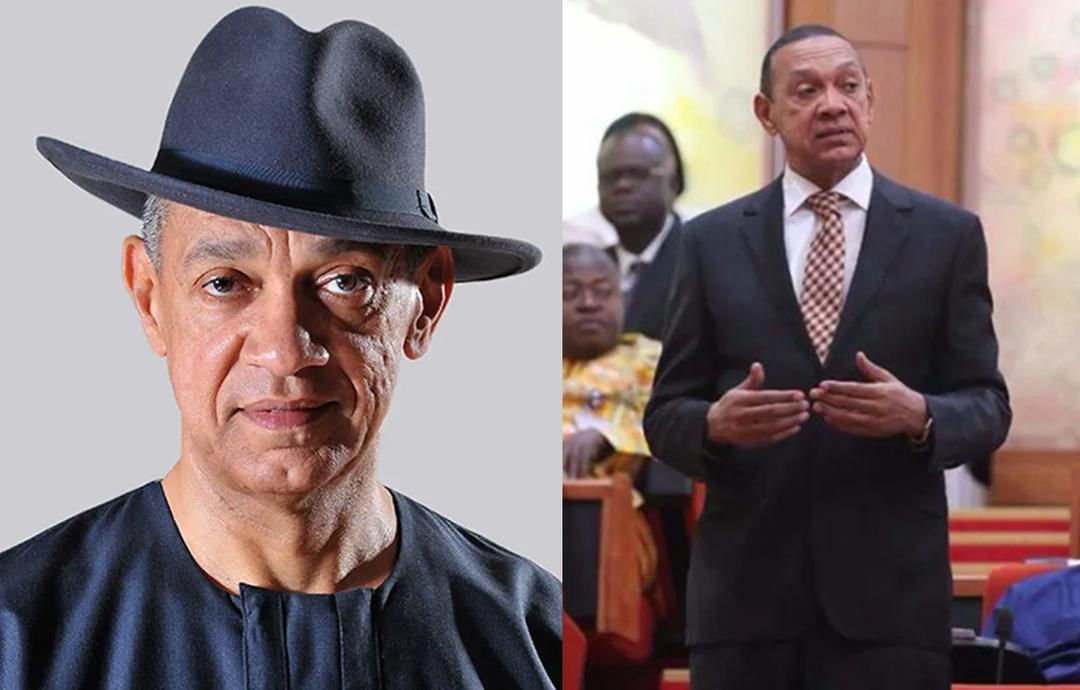
Senator Ben Bruce Predicts a Global War But Declares Nigeria Will Be Africa’s Safe Haven

In a statement that has left many stunned, intrigued, and divided in opinion, Nigerian senator and media mogul Ben Murray-Bruce has declared his belief that the world is inching dangerously close to the brink of World War III, a catastrophe he describes as terrible in scale and impact. But in a twist that has sparked both nationalistic pride and critical debate, the Senator insists that Africa—particularly Nigeria—will emerge untouched by the looming global destruction.
“I see World War III coming and it’s going to be terrible,” Murray-Bruce said with stark conviction. “But the beauty is that it’s not going to affect Africa. We are going to be safe in Nigeria.”
His words have ricocheted across social media platforms and news outlets, igniting a whirlwind of reactions from Nigerians and global observers alike. Coming at a time when geopolitical tensions between major world powers are escalating, with wars already active in several regions and diplomatic relations between superpowers at an all-time low, the Senator’s remarks feel less like hyperbole and more like a reflection of collective anxiety.
Murray-Bruce, known for his “Common Sense” series and progressive political stances, has long been vocal about global affairs. But this prediction, framed with such clarity and certainty, has pushed him into a fresh spotlight. For some, it’s a moment of validation—a chance to finally perceive Africa not just as a bystander in global matters, but as a sanctuary. For others, it’s wishful thinking, and dangerously so.
His declaration raises profound questions. What makes Africa immune to a global war? Why Nigeria? And what evidence supports such optimism?
Ben Bruce didn’t offer a detailed breakdown of how this scenario might unfold, but analysts have begun dissecting the comment, trying to piece together its logic. Some argue that Africa’s historical position on the global geopolitical chessboard—often viewed as peripheral to Western and Eastern power struggles—might ironically serve as a buffer. Unlike regions of Europe, Asia, or the Middle East, which are often entangled in alliances, treaties, and retaliatory policies, Africa has maintained a relatively non-confrontational stance in many global military conflicts.
Furthermore, Nigeria’s geographic location—far from the flashpoints of NATO-Russia tensions, U.S.-China economic rivalry, and Middle Eastern volatility—could, in theory, provide a natural shield. Others believe Bruce is banking on the continent’s longstanding neutrality and its lack of deep involvement in global power disputes as a reason for his confidence.
Yet, skeptics are not convinced. Many argue that no region is truly safe in a world war, especially not in today’s age of interconnected economies and global supply chains. Any significant disruption in Europe or Asia could have ripple effects that would devastate developing nations. Fuel prices, food imports, medical supplies—all are intricately tied to international cooperation. The idea that Nigeria could escape unscathed has, for some, raised alarms about national preparedness and political complacency.
Still, in a nation often battered by its own internal struggles—from economic hardship and insecurity to infrastructural decay and political instability—Murray-Bruce’s words have found unexpected comfort among some citizens. For them, it’s a rare narrative shift: a vision of Nigeria not as the epicenter of crisis, but as a place of safety, of refuge, of hope.
“This might sound controversial,” tweeted one supporter, “but I actually feel what Ben Bruce is saying. We always think we are the problem. Maybe it’s time to think that we might actually be the solution—or at least the escape.”
But while some celebrated the idea of Nigeria as a sanctuary, others pushed back sharply, questioning whether the country is even safe for its own people, much less outsiders in a war scenario. Online comments ranged from sarcastic jabs to outright outrage.
“How can we be safe from WW3 when we aren’t even safe from bandits?” one user asked.
“Ben Bruce should come and live in the North for a week and tell us again how Nigeria is safe,” another wrote.
The paradox is glaring: on one hand, Nigeria might not be a military target in a global conflict; on the other, the daily reality of violence, economic strain, and institutional failure casts doubt on the country’s capacity to provide genuine safety or stability.
Some analysts, however, suggest that Murray-Bruce’s statement could be interpreted less literally and more symbolically. Perhaps his point is that while the world’s so-called “superpowers” rush toward destructive ends, Africa has an opportunity to redefine its path. In refusing to be pawns in global wars, African nations might finally assert a new kind of leadership—one rooted in diplomacy, neutrality, and internal development.
There’s historical context to this as well. During both World War I and II, African nations were dragged into conflicts not of their making, forced to provide resources, manpower, and colonial loyalty. The scars of those wars still linger. In a possible World War III, if one ever arises, many African thinkers have argued that the continent should maintain strict non-alignment and preserve its autonomy.
Ben Murray-Bruce’s comment, controversial as it may be, could be seen as a call for African consciousness—to protect what’s left, to shield the continent from another round of imported catastrophe. It could be an urging to leaders to prepare, not just militarily but socially and economically, for the tremors of a world collapsing under its own ambition.
In the end, whether his prediction comes true or not remains uncertain. But one thing is clear: his words have sparked a conversation that cuts deeper than mere speculation. It has opened up questions about identity, sovereignty, destiny, and global perception.
As the world watches unfolding tensions in Ukraine, Taiwan, the Middle East, and other hotspots, Nigeria and its neighbors must reckon with the possibility that being uninvolved doesn’t always mean being unaffected. If anything, this might be the perfect time for Nigeria to reconsider its strategic position—not just in Africa but in the world.
Ben Murray-Bruce has always had a flair for bold statements. Whether this one becomes prophecy or passes as another controversial soundbite, it has undeniably stirred minds and imaginations. And maybe, just maybe, that’s the kind of common sense the world desperately needs right now.


